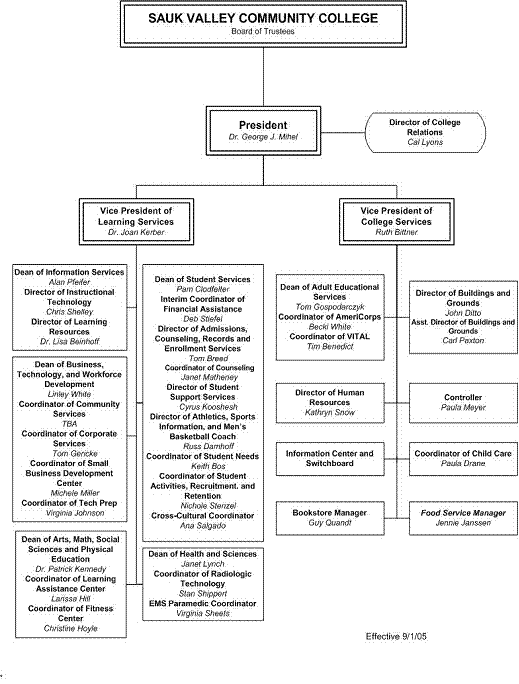

Reason for the Focused Evaluation
The Higher Learning Commission's most recent comprehensive evaluation of Sauk Valley Community College was conducted April 13, 2002. The HLC visiting team determined that the areas of assessment of student academic achievement and strategic planning were insufficiently developed and necessitated special attention by the College to the following concerns:
Strategic Planning
Rationale and Expectations:
Strategic planning is central not only to the criterion, but for
the operational health of the college. Without question, the
strategic planning process at the college has improved since the
1991 Team Visit. Clear evidence of planning documents exists (i.e.
facilities plan, operational plan, technology plan, etc.), however
these documents remain largely incomplete.
Additionally, as part of the visit, the Team determined that concern existed among faculty and staff regarding their low level of involvement, lack of awareness regarding goal achievement, or an understanding of how the progress of the plan is evaluated. Further, a review of the aforementioned plans offers no clear linkages with other college plans, or with the college budgets. Finally, with the exception of the annualized "operational" plan, there was little indication of staff responsible, resource implications, timeline for implementation, and evaluative components to the plans.
These expectations are addressed in detail in Chapter 2.

Illustration 1: Organization Chart
NOTE:Â The duties of the Director of Grants, Planning, and Institutional Research are currently held by Dean of Adult Educational Services, Thomas Gospodarczyk, pending an administrative reorganization currently in the planning process, according to an announcement in January 2006 by President Mihel.
Assessment of Student Academic Achievement
Rationale and Expectations:
There exists no clearly defined philosophy statement regarding
general education requirements as agreed upon by the faculty, no
identification and articulation of expected competencies to be
attained by students within each area, no method of assessment and
measurement of those areas of importance, generally no stated
career program outcomes, and no current process for including the
results in instructional improvement and the annual budgeting of
the institution. Faculty generally does not demonstrate a shared
understanding of the potential or goals of academic assessment and
they demonstrate only minimal buy-in to the overall
program.
Necessary professional developmental funds are not allocated to support consultants and employee travel required to develop an understanding of an effective program of student academic assessment.
These expectations are addressed in detail in Chapter 3.







